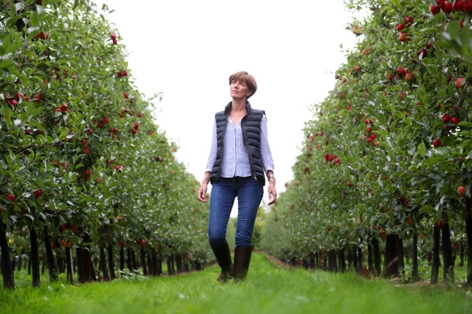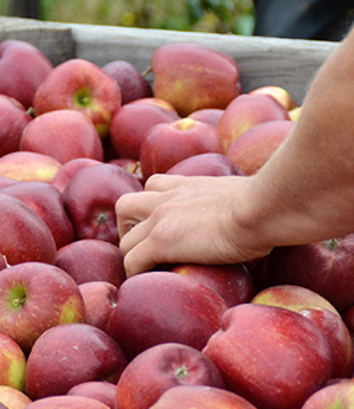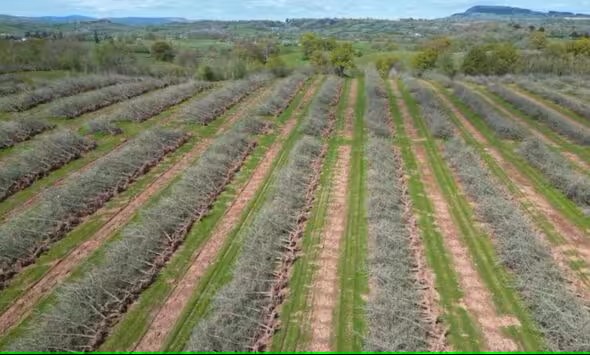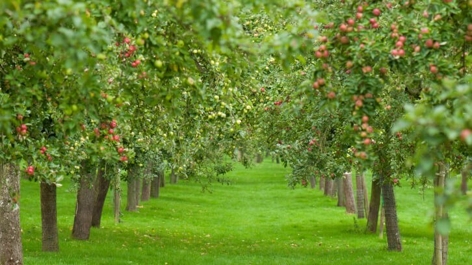

This week the English Apple Man features the latest news from British Apples and Pears website
In my Journal for 19th April, I reported on the BAPL AGM and a presentation by Ged Futter. Lots of 'pragmatism' from Ged and my summary which suggests a very challenging future for British apple growers.
While my gut feeling is much the same and I believe we are in for some considerable upheaval with many growers either 'selling up' or at he very least 'grubbing up' and moving out of apple production into cereals (where possible) or something requiring short term investment rather than the long term investment of growing apple trees, Is there a semblance of hope on the horizon?
Certainly Al Capper BAPL Executive Chair presents some elements of optimism in the latest BAPL News Letter.
 New six month sales data from BAPL
New six month sales data from BAPL
"Six months since the start of the British apple and pear season (starting October 2023), British Apples & Pears Limited (BAPL) has analysed which supermarkets have surpassed last year's performance and which are lagging behind.
Of the 10 supermarkets analysed, seven managed to increase the volume of British apples and pears bought from BAPL growers compared to the same period in 2022/23. The top performers were Sainsbury's which bought 2,737 more tonnes of British apples and pears and Lidl which bought 2,597 more tonnes than the previous year.
Tesco has fallen just slightly behind its 2022/23 performance - selling 714 tonnes fewer British apples and pears in the first six months of the season. However, it was hampered by a slow start in October and is now catching up with the other top performers.
Unfortunately, not all supermarkets have improved in terms of supporting British apples and pears and buying more this season compared to last. The biggest underperformer was Morrisons, selling 2,613 fewer tonnes between October and March 2023/24 compared to the same period in 2022/23.
"Things are getting very tight at the top of the league table this year." Explained executive chair of BAPL, Ali Capper. "Aldi is currently beating Tesco, but only by 333 tonnes. Sainsbury's and Lidl are both closing the gap on the top two. It's going to be fascinating to see how the rest of the year turns out"
"We're delighted that most supermarkets are buying more British apples and pears than they were this time last year. We know that's what consumers want, and we welcome the recent moves by some supermarkets to make it easier for online shoppers to choose British. That's another great step towards making buying British as easy as possible."
Every month, BAPL publishes supermarket sales data on its website to shine a light on which supermarkets are putting their buying power behind British. The monthly data tables can be viewed at the links below: New six month sales data from BAPL
 Six months since the start of the British apple and pear season (starting October 2023), British Apples & Pears Limited (BAPL) has analysed which supermarkets have surpassed last year's performance and which are lagging behind.
Six months since the start of the British apple and pear season (starting October 2023), British Apples & Pears Limited (BAPL) has analysed which supermarkets have surpassed last year's performance and which are lagging behind.
Of the 10 supermarkets analysed, seven managed to increase the volume of British apples and pears bought from BAPL growers compared to the same period in 2022/23. The top performers were Sainsbury's which bought 2,737 more tonnes of British apples and pears and Lidl which bought 2,597 more tonnes than the previous year.
Tesco has fallen just slightly behind its 2022/23 performance - selling 714 tonnes fewer British apples and pears in the first six months of the season. However, it was hampered by a slow start in October and is now catching up with the other top performers.
Click on BAPL Supermarket sales data
Bulmers Cider owner Heineken, which is the UK's cider maker, has grubbed up a 300 acre orchard at Penrhos near the Offa's Dyke path in Monmouthshire, citing reduced demand for the alcoholic drink.

Below: Heineken Cider Orchard
 The orchard was planted in 1997, but reports suggest that the company is now looking to sell the land. Heineken said it would still source the fruit for its cider from the UK. It told the BBC, that it was "incredibly important that we act responsibly and sustainably at all times" and the move was prompted by the slowing cider market and improved growing practices.
The orchard was planted in 1997, but reports suggest that the company is now looking to sell the land. Heineken said it would still source the fruit for its cider from the UK. It told the BBC, that it was "incredibly important that we act responsibly and sustainably at all times" and the move was prompted by the slowing cider market and improved growing practices.
According to the National Association of Cider Makers said 2,000 acres of British cider apple orchards had been lost in the past few years as the amount of cider being drunk in the UK had dropped by a third over the past 10 years "leading to this devastating loss of orchards".
Local people and wildlife campaigners criticised the move, with Ecologist Chris Formaggia telling the broadcaster, "At this time now all the trees would be in their full blossom. It would be a really impressive area so the changes are absolutely total, really.
"This orchard was absolutely teeming with these winter thrushes. I think inevitably there will be a big loss here, particularly with those wintering populations."
The English Apple Man comments:
As someone who has spent all my life; either living or working on a fruit farm, or closely involved, the balance between the ecological benefits of well established orchards and the commercial reality are so often at odds. I remember attending a rural discussion group 20 plus years ago, and as we settled down for our discussion, this lady said; " I have just driven past this pear orchard and they are grubbing it, WHY? it is still growing pears! Well I said the trouble is it's costing the grower much more to keep it than the pears are worth!
There is no easy answer!
New technology is appearing at an exponential rate in so many industries, and over the last few years the introduction of new technology in apple growing is a incredible!
AI technologies could be coming to an orchard near you. Things are high tech now in some UK apple and pear orchards. The latest ideas involve 'listening' to the trees to find out exactly when they are starting to feel thirsty.
British apple supplier and BAPL member, Adrian Scripps, has joined a trial to evaluate a new 'listening' 'technology. The sensors on the trees detect biosignals that give growers an early alert to potential stresses - like needing a drink!
The sensors are small, with two wires that go into the tree, usually into a branch. They detect micro-electric biosignals inside the tree and trigger irrigation the moment the tree needs it. The grower no longer has to guess, or wait for the tree to show signs of 'thirst' - such as leaves dropping or going yellow.
The fact is that by the time the tree is showing visible signs of stress, the damage may have been done. So it's better to be able to provide some water before that happens.
We're also very mindful of the need to conserve water as much as we can. And this technology can help growers do just that. While we might have the perfect maritime climate for growing delicious apples in the UK, rain is not always in plentiful supply. Water sustainability is very important.
Ultimately this technology can also help growers conserve water and be more sustainable. Without this insight, growers might have to water the trees when they 'think' they might be thirsty and that could be a waste.
![]() That is all for this week
That is all for this week
Take care
The English Apple Man